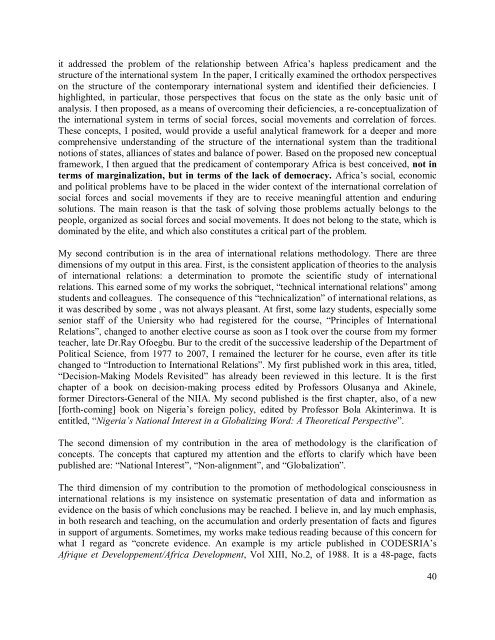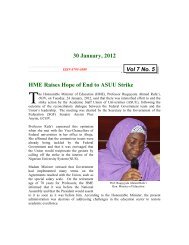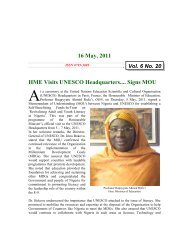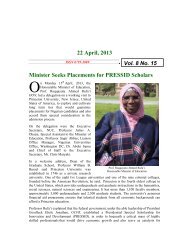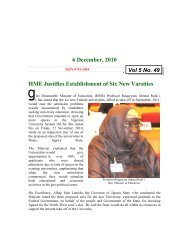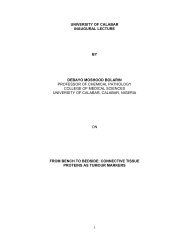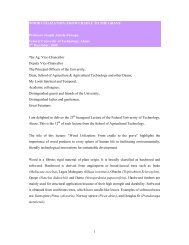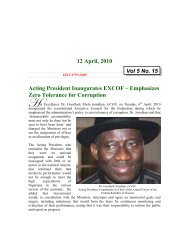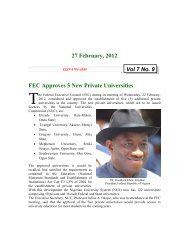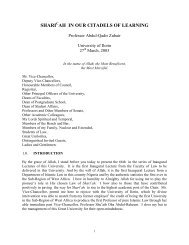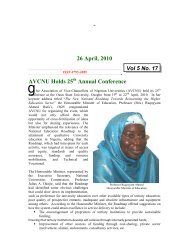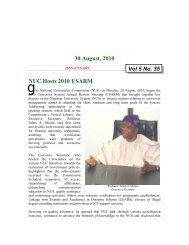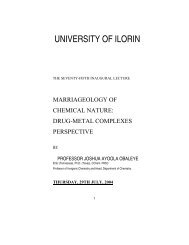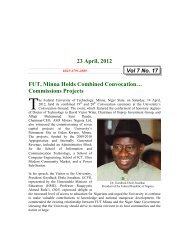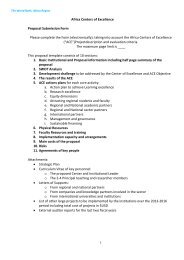From State And State Power To Man And Social - National ...
From State And State Power To Man And Social - National ...
From State And State Power To Man And Social - National ...
You also want an ePaper? Increase the reach of your titles
YUMPU automatically turns print PDFs into web optimized ePapers that Google loves.
it addressed the problem of the relationship between Africa’s hapless predicament and thestructure of the international system In the paper, I critically examined the orthodox perspectiveson the structure of the contemporary international system and identified their deficiencies. Ihighlighted, in particular, those perspectives that focus on the state as the only basic unit ofanalysis. I then proposed, as a means of overcoming their deficiencies, a re-conceptualization ofthe international system in terms of social forces, social movements and correlation of forces.These concepts, I posited, would provide a useful analytical framework for a deeper and morecomprehensive understanding of the structure of the international system than the traditionalnotions of states, alliances of states and balance of power. Based on the proposed new conceptualframework, I then argued that the predicament of contemporary Africa is best conceived, not interms of marginalization, but in terms of the lack of democracy. Africa’s social, economicand political problems have to be placed in the wider context of the international correlation ofsocial forces and social movements if they are to receive meaningful attention and enduringsolutions. The main reason is that the task of solving those problems actually belongs to thepeople, organized as social forces and social movements. It does not belong to the state, which isdominated by the elite, and which also constitutes a critical part of the problem.My second contribution is in the area of international relations methodology. There are threedimensions of my output in this area. First, is the consistent application of theories to the analysisof international relations: a determination to promote the scientific study of internationalrelations. This earned some of my works the sobriquet, “technical international relations” amongstudents and colleagues. The consequence of this “technicalization” of international relations, asit was described by some , was not always pleasant. At first, some lazy students, especially somesenior staff of the Uniersity who had registered for the course, “Principles of InternationalRelations”, changed to another elective course as soon as I took over the course from my formerteacher, late Dr.Ray Ofoegbu. Bur to the credit of the successive leadership of the Department ofPolitical Science, from 1977 to 2007, I remained the lecturer for he course, even after its titlechanged to “Introduction to International Relations”. My first published work in this area, titled,“Decision-Making Models Revisited” has already been reviewed in this lecture. It is the firstchapter of a book on decision-making process edited by Professors Olusanya and Akinele,former Directors-General of the NIIA. My second published is the first chapter, also, of a new[forth-coming] book on Nigeria’s foreign policy, edited by Professor Bola Akinterinwa. It isentitled, “Nigeria’s <strong>National</strong> Interest in a Globalizing Word: A Theoretical Perspective”.The second dimension of my contribution in the area of methodology is the clarification ofconcepts. The concepts that captured my attention and the efforts to clarify which have beenpublished are: “<strong>National</strong> Interest”, “Non-alignment”, and “Globalization”.The third dimension of my contribution to the promotion of methodological consciousness ininternational relations is my insistence on systematic presentation of data and information asevidence on the basis of which conclusions may be reached. I believe in, and lay much emphasis,in both research and teaching, on the accumulation and orderly presentation of facts and figuresin support of arguments. Sometimes, my works make tedious reading because of this concern forwhat I regard as “concrete evidence. An example is my article published in CODESRIA’sAfrique et Developpement/Africa Development, Vol XIII, No.2, of 1988. It is a 48-page, facts40


